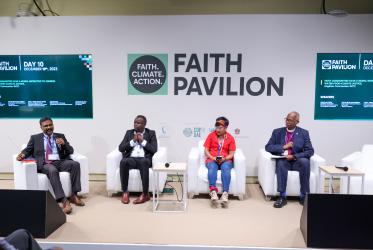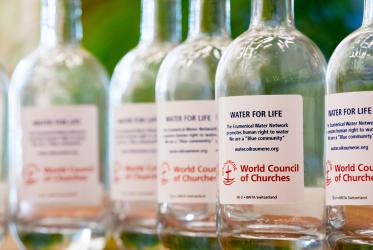21-25 May 2007, Entebbe, Uganda
"I was thirsty and you gave me nothing to drink"
Matthew 25, 42
Convened by the Ecumenical Water Network (EWN) and hosted by the All Africa Conference of Churches (AACC) and the Uganda Joint Christian Council (UJCC), the "Churches for Water in Africa" Conference took place in Entebbe, Uganda from 21st to 25th May 2007, with participants representing churches, church-based organisations, faith based development agencies, and other civil society organisations from 19 African countries1 as well as guests from Europe and Latin America. The purpose of the Conference was to deliberate on the water challenges in Africa, to exchange experiences on the water related development work and to share theological reflections on water and the role of the churches.
As churches and faith based organisations we affirm water as the cradle and source of life, an expression of God's grace in perpetuity for the whole of creation. We are called to exercise responsible stewardship for this unique trust, and to preserve and share it for the benefit of humanity and all creation. Further we share the following convictions: that access to water is a fundamental human right, that the protection and control of water resources is a central public responsibility, and that water must not be treated as a commodity but as an essential social good for the present and future generations. We recognise water as a sacred gift of God.
We have learnt from the experience of the 75 fellow participants, lectures and presentations, as well as from members of communities with whom we interacted during our visits to informal settlements in Kampala and rural communities in Masaka and Busoga.
We recognise that water is key to the livelihoods for communities, and the entry point for any development. Poverty can never be overcome, if the issue of water and sanitation is not adequately addressed.
We are deeply concerned that in spite of all promises made in the context of the Millennium Development Goals, in rural Africa 65% of the population still lack access to adequate water supply and 73% access to adequate sanitation. Lack of water and sanitation reinforces the cycle of poverty and therefore diminishes the chance to achieve any of the Millennium Development Goals. We concur with the UNDP Human Development Report 2006, that this situation is mainly due to lack of political will at governmental, intergovernmental and international financial institutions levels.
We urge governments, in Africa and in the industrialized countries, as well as multilateral institutions to respect the human right to water and to respond to their respective obligations. Provision of water for all is possible - the way towards it passes through the prioritisation of the poor and most excluded in water policies and funds allocation.
The participation of these communities at all stages of intervention is not only a democratic imperative, but also a precondition for sustainability and prerequisite for peace. Our sharing experiences also revealed that water supply, sanitation and protection of environment, including watershed management, should never be separated but be worked on in a holistic way.
The Conference raised concerns about ongoing and potential conflicts over water at local, national and inter-state levels. Having discussed different experiences, for example the Nile, we express our conviction that water conflicts can be turned into signs of hope, if non-violent solutions are sought. This must be done together with the affected population, based on mutual respect for the right to water.
We are deeply troubled by the aggravating impact of climate change which threatens to further alter the water patterns in Africa. Climate change is already causing unpredictable rainfall, prolonged droughts, devastating floods, desertification and drying up of water sources. The existence and future of millions of people is jeopardized. We urge the industrialized countries to take their responsibility, and together with industrializing countries to start immediately to cut the emission of carbon dioxide, to put advanced alternative energy technology at the disposal of Africa and to assure funding for mitigation and adaptation measures in Africa, as well as in other affected regions of the Global South.
We call upon African governments and their institutions to follow a path to development, which protects the environment and gives sustainable options for peoples' future. One important step is to prioritise the just and sustainable provision of water to the poor and most excluded, and to make water and sanitation a strong component of national budgets and other financial allocations, including development aid.
We recognise and affirm communities' own initiatives, skills and knowledge in dealing with water scarcity, and therefore advocate for technologies that are appropriate and relevant to the cultures and contexts of the people. We further reiterate our commitment to strengthen our support and work with poor rural and urban communities in their endeavours to find sustainable supplies of water, the provision of safe sanitation, and to protect the environment. Equally, we reiterate our commitment for a people centred advocacy for the human right to water in our countries, as well as internationally, as part of the Ecumenical Water Network.
"Let justice roll down like waters, and righteousness like an ever-flowing stream."
Amos 5, 24
May 25th 2007, Entebbe, Uganda
The Ecumenical Water Network (EWN) is an initiative of the World Council of Churches, Lutheran World Federation, World Alliance of Reformed Churches, the All Africa Conference of Churches, Latin American Council of Churches, Church of Sweden, Bread for the World (Germany), Norwegian Church Aid, Church World Service (USA), Cairos Canada and others. The EWN is committed to the exchange of best practices on community based water programmes and to the advocacy work for the human right to water. Its secretariat is hosted by the World Council of Churches in Geneva, Switzerland.
[1] Botswana, Burkina Faso, Burundi, Cameroon, Congo Brazzaville, Egypt, Eritrea, Ethiopia, Ghana, Kenya, Lesotho, Liberia, Mali, Rwanda, South Africa, Sudan, Tanzania, Uganda, and Zimbabwe.




